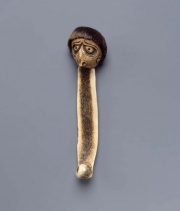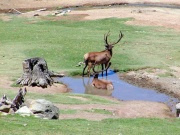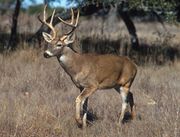Difference between revisions of "Antler"
| (One intermediate revision by one other user not shown) | |||
| Line 1: | Line 1: | ||
| − | [[File:11.23722-CR8379-d1.jpg|thumb|]] | + | [[File:11.23722-CR8379-d1.jpg|thumb|Carved stag antler<br>MFA# 11.23722]] |
== Description == | == Description == | ||
| − | + | [[File:antlerwp2.jpg|thumb|Elk]] | |
A bony horn that grows on the head of deer, moose, elk, and caribou from the Cervidae family. New antlers are grown each year. They start as soft tissue covered in fur that is called velvet. The spongy, calcareous tissue hardens with time and the deer rub off the protective velvet covering. Antlers are [[bone|bone]], but have a uniform outer cortex structure with a spongy center core. They are primarily composed of [[calcium%20hydroxyapatite|calcium hydroxyapatite]] with smaller amounts of [[calcium%20carbonate|calcium carbonate]], [[calcium%20fluoride|calcium fluoride]], and [[magnesium%20phosphate|magnesium phosphate]]. Antlers also contain about 30% [[ossein|ossein]], a high molecular weight [[protein|protein]]. The hard, but carvable, material has been used since Paleolithic times for numerous small items such as points, harpoons, needles, combs, and axe handles. | A bony horn that grows on the head of deer, moose, elk, and caribou from the Cervidae family. New antlers are grown each year. They start as soft tissue covered in fur that is called velvet. The spongy, calcareous tissue hardens with time and the deer rub off the protective velvet covering. Antlers are [[bone|bone]], but have a uniform outer cortex structure with a spongy center core. They are primarily composed of [[calcium%20hydroxyapatite|calcium hydroxyapatite]] with smaller amounts of [[calcium%20carbonate|calcium carbonate]], [[calcium%20fluoride|calcium fluoride]], and [[magnesium%20phosphate|magnesium phosphate]]. Antlers also contain about 30% [[ossein|ossein]], a high molecular weight [[protein|protein]]. The hard, but carvable, material has been used since Paleolithic times for numerous small items such as points, harpoons, needles, combs, and axe handles. | ||
| − | [[File: | + | [[File:deer2wp2.jpg|thumb|White-tailed deer]] |
| − | |||
== Synonyms and Related Terms == | == Synonyms and Related Terms == | ||
antlers; horn; merrain (Fr.); gevir (Dan.); Geweih (Deut.); gewei (Ned.); | antlers; horn; merrain (Fr.); gevir (Dan.); Geweih (Deut.); gewei (Ned.); | ||
| − | == | + | == Physical and Chemical Properties == |
Thin sections of antler show random blood vessels paths (Thornton 1981) | Thin sections of antler show random blood vessels paths (Thornton 1981) | ||
| − | == | + | ==Resources and Citations== |
| − | + | * J.Thornton,"The Structure of Ivory and Ivory Substitutes", AIC Preprints, Philadelphia, 1981, p.173-181 | |
| − | J.Thornton,"The Structure of Ivory and Ivory Substitutes", AIC Preprints, Philadelphia, 1981, p.173-181 | ||
| − | |||
| − | |||
| − | |||
| − | |||
| − | |||
| − | |||
| − | |||
| − | |||
| − | |||
* G.S.Brady, ''Materials Handbook'', McGraw-Hill Book Co., New York, 1971 | * G.S.Brady, ''Materials Handbook'', McGraw-Hill Book Co., New York, 1971 | ||
| Line 35: | Line 24: | ||
* A. MacGregor, ''Bone, Antler, Ivory, and Horn'', Croom Helm, London, 1985 | * A. MacGregor, ''Bone, Antler, Ivory, and Horn'', Croom Helm, London, 1985 | ||
| − | * Wikipedia | + | * Wikipedia: http://en.wikipedia.org/wiki/Antler (Accessed Mar. 20, 2006) -for non-English terms |
* Art and Architecture Thesaurus Online, http://www.getty.edu/research/tools/vocabulary/aat/, J. Paul Getty Trust, Los Angeles, 2000 | * Art and Architecture Thesaurus Online, http://www.getty.edu/research/tools/vocabulary/aat/, J. Paul Getty Trust, Los Angeles, 2000 | ||
Latest revision as of 13:42, 27 April 2022
Description
A bony horn that grows on the head of deer, moose, elk, and caribou from the Cervidae family. New antlers are grown each year. They start as soft tissue covered in fur that is called velvet. The spongy, calcareous tissue hardens with time and the deer rub off the protective velvet covering. Antlers are Bone, but have a uniform outer cortex structure with a spongy center core. They are primarily composed of Calcium hydroxyapatite with smaller amounts of Calcium carbonate, Calcium fluoride, and Magnesium phosphate. Antlers also contain about 30% Ossein, a high molecular weight Protein. The hard, but carvable, material has been used since Paleolithic times for numerous small items such as points, harpoons, needles, combs, and axe handles.
Synonyms and Related Terms
antlers; horn; merrain (Fr.); gevir (Dan.); Geweih (Deut.); gewei (Ned.);
Physical and Chemical Properties
Thin sections of antler show random blood vessels paths (Thornton 1981)
Resources and Citations
- J.Thornton,"The Structure of Ivory and Ivory Substitutes", AIC Preprints, Philadelphia, 1981, p.173-181
- G.S.Brady, Materials Handbook, McGraw-Hill Book Co., New York, 1971
- Hermann Kuhn, Conservation and Restoration of Works of Art and Antiquities, Butterworths, London, 1986
- Henry Hodges, Artifacts: An Introduction to Early Materials and Technology, Ronald P. Frye, Kingston, Canada, 1988
- A. MacGregor, Bone, Antler, Ivory, and Horn, Croom Helm, London, 1985
- Wikipedia: http://en.wikipedia.org/wiki/Antler (Accessed Mar. 20, 2006) -for non-English terms
- Art and Architecture Thesaurus Online, http://www.getty.edu/research/tools/vocabulary/aat/, J. Paul Getty Trust, Los Angeles, 2000


